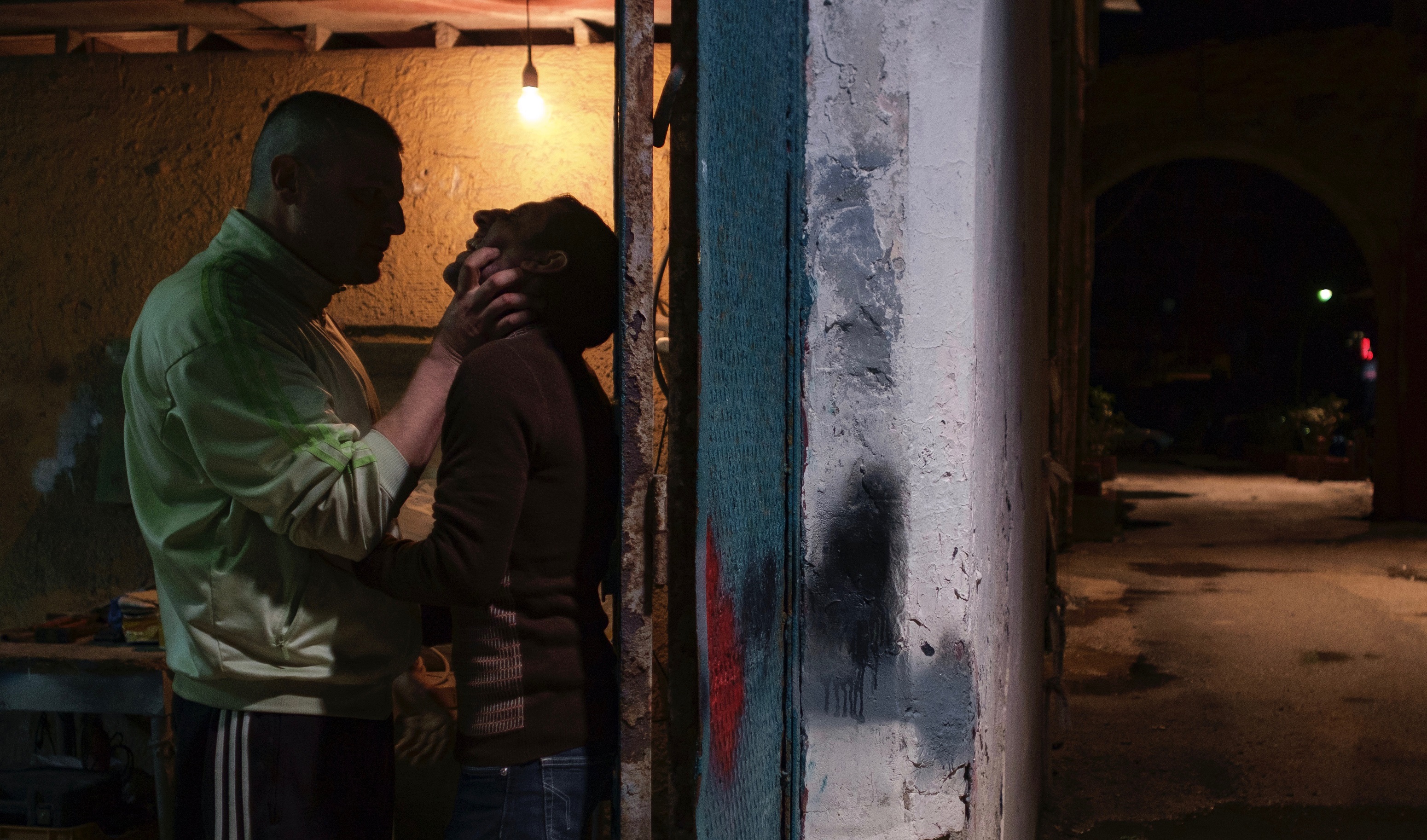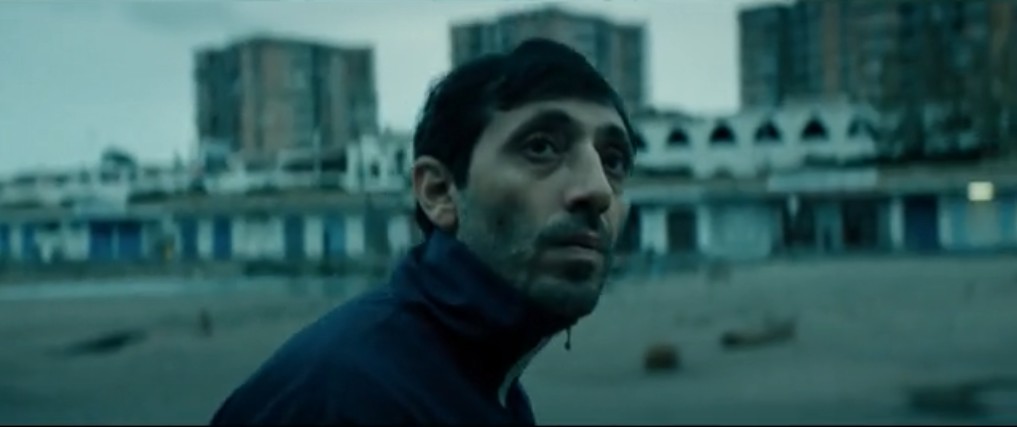★★★★ DOGMAN Matteo Garrone takes on the mafia again
Black comedy crime caper turns very dark but never loses all its heart
There aren’t many movies that cater to audiences with a passion for canine grooming, the mafia and dismal seaside resorts but Dogman more than satisfies all those cravings. Ten years after Matteo Garrone won Cannes with the searingly brutal Gomorrah, the director returns with another drawn-from-life tale of everyday Italian mobsters.
The titular hero is Marcello (Marcello Fonte), a scrawny little geezer who runs a beauty parlour for dogs in a grungy town marooned by the sea. The film opens with him nervously primping a snarling pitbull that looks as if it could eat him for breakfast. But Marcello is a dog whisperer, capable of soothing the most savage of beasts; he can even bring frozen chihuahuas back from the dead. He’s a loveable loser who adores his young daughter Alida and aims to be pals with all the local lowlifes. There are some lovely comic scenes between father, daughter and dogs which warm up the audience and serve to heighten the horror when the close-up and all too real violence kicks in. Marcello’s not making quite enough euros clipping claws and fluffing fur to take Alida on her dream holiday so he also sells cocaine on the side. It’s the dealing that traps him in the terrifying orbit of Simoncino (Edoardo Pesce, pictured above), a psychotic former boxer who thinks nothing of pulverising a fruit machine and then demanding his money back from the arcade owner. All the local mafioso agree that Simoncino is a problem but no-one wants to take him on. Marcello tries to appease him, like a dog trying to ingratiate himself with an abusive master. He not only gets suckered into Simone’s coke-fuelled burglaries but does jail time for him.
Marcello’s not making quite enough euros clipping claws and fluffing fur to take Alida on her dream holiday so he also sells cocaine on the side. It’s the dealing that traps him in the terrifying orbit of Simoncino (Edoardo Pesce, pictured above), a psychotic former boxer who thinks nothing of pulverising a fruit machine and then demanding his money back from the arcade owner. All the local mafioso agree that Simoncino is a problem but no-one wants to take him on. Marcello tries to appease him, like a dog trying to ingratiate himself with an abusive master. He not only gets suckered into Simone’s coke-fuelled burglaries but does jail time for him.  Garrone is a master of hyperrealism and bone-crunching violence. The action is set in the emptied piazzas and back alleys of a disintegrating southern Italian seaside resort. A lot of scenes take place at night in the murk of sodium lights; when there are daytime scenes, they are shot in desaturated colour. It’s not a pretty world, unless you’re a poodle having your fuzzy topknot sprayed for a dog show. First time actor Marcello Fonte (pictured above) is a great discovery, it’s as if Buster Keaton and Steve Buscemi had a son together and left him to grow up with bad teeth and a crooked nose. His journey from endearing stooge to avenging desperado is slow and graphic. Simoncino is a horror movie monster who seems destined to keep coming back, no matter the blows. There are no happy endings.
Garrone is a master of hyperrealism and bone-crunching violence. The action is set in the emptied piazzas and back alleys of a disintegrating southern Italian seaside resort. A lot of scenes take place at night in the murk of sodium lights; when there are daytime scenes, they are shot in desaturated colour. It’s not a pretty world, unless you’re a poodle having your fuzzy topknot sprayed for a dog show. First time actor Marcello Fonte (pictured above) is a great discovery, it’s as if Buster Keaton and Steve Buscemi had a son together and left him to grow up with bad teeth and a crooked nose. His journey from endearing stooge to avenging desperado is slow and graphic. Simoncino is a horror movie monster who seems destined to keep coming back, no matter the blows. There are no happy endings.
Some have read Dogman as an allegory of the current state of Italian politics with the little people trying to appease the fascists but losing their own morality in the process; it’s plausible that Garrone had that aim in mind. But it’s also perfectly possible to enjoy the film just on face value, as long as vicious criminals, dogs and drab coastal towns are your thing.
@saskiabaron
Overleaf: watch the trailer for Dogman

 Marcello’s not making quite enough euros clipping claws and fluffing fur to take Alida on her dream holiday so he also sells cocaine on the side. It’s the dealing that traps him in the terrifying orbit of Simoncino (Edoardo Pesce, pictured above), a psychotic former boxer who thinks nothing of pulverising a fruit machine and then demanding his money back from the arcade owner. All the local mafioso agree that Simoncino is a problem but no-one wants to take him on. Marcello tries to appease him, like a dog trying to ingratiate himself with an abusive master. He not only gets suckered into Simone’s coke-fuelled burglaries but does jail time for him.
Marcello’s not making quite enough euros clipping claws and fluffing fur to take Alida on her dream holiday so he also sells cocaine on the side. It’s the dealing that traps him in the terrifying orbit of Simoncino (Edoardo Pesce, pictured above), a psychotic former boxer who thinks nothing of pulverising a fruit machine and then demanding his money back from the arcade owner. All the local mafioso agree that Simoncino is a problem but no-one wants to take him on. Marcello tries to appease him, like a dog trying to ingratiate himself with an abusive master. He not only gets suckered into Simone’s coke-fuelled burglaries but does jail time for him.  Garrone is a master of hyperrealism and bone-crunching violence. The action is set in the emptied piazzas and back alleys of a disintegrating southern Italian seaside resort. A lot of scenes take place at night in the murk of sodium lights; when there are daytime scenes, they are shot in desaturated colour. It’s not a pretty world, unless you’re a poodle having your fuzzy topknot sprayed for a dog show. First time actor Marcello Fonte (pictured above) is a great discovery, it’s as if Buster Keaton and Steve Buscemi had a son together and left him to grow up with bad teeth and a crooked nose. His journey from endearing stooge to avenging desperado is slow and graphic. Simoncino is a horror movie monster who seems destined to keep coming back, no matter the blows. There are no happy endings.
Garrone is a master of hyperrealism and bone-crunching violence. The action is set in the emptied piazzas and back alleys of a disintegrating southern Italian seaside resort. A lot of scenes take place at night in the murk of sodium lights; when there are daytime scenes, they are shot in desaturated colour. It’s not a pretty world, unless you’re a poodle having your fuzzy topknot sprayed for a dog show. First time actor Marcello Fonte (pictured above) is a great discovery, it’s as if Buster Keaton and Steve Buscemi had a son together and left him to grow up with bad teeth and a crooked nose. His journey from endearing stooge to avenging desperado is slow and graphic. Simoncino is a horror movie monster who seems destined to keep coming back, no matter the blows. There are no happy endings.